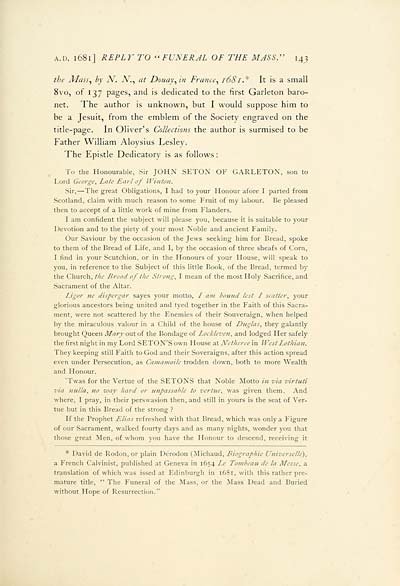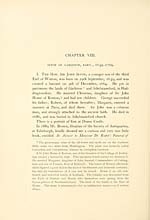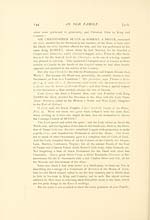Old family; or, The Setons of Scotland and America
(179) Page 143
Download files
Complete book:
Individual page:
Thumbnail gallery: Grid view | List view

a.d. 1681] REPLY TO "FUNERAL OF THE MASS." 143
the Mass, by N. A r ., at Douay,in France, 168 1.* It is a small
8vo, of 137 pages, and is dedicated to the first Garleton baro-
net. The author is unknown, but I would suppose him to
be a Jesuit, from the emblem of the Society engraved on the
title-page. In Oliver's Collections the author is surmised to be
Father William Aloysius Lesley.
The Epistle Dedicatorv is as follows :
To the Honourable, Sir JOHN SETON OF GARLETON, son to
Lord George, Late Earl of Winton.
Sir, — The great Obligations, I had to your Honour afore I parted from
Scotland, claim with much reason to some Fruit of my labour, lie pleased
then to accept of a little work of mine from Flanders.
I am confident the subject will please you, because it is suitable to your
Devotion and to the piety of your most Noble and ancient Family.
Our Saviour by the occasion of the Jews seeking him for Bread, spoke
to them of the Bread of Life, and I, by the occasion of three sheafs of Corn,
I find in your Scutchion, or in the Honours of your House, will speak to
you, in reference to the Subject of this little Book, of the Bread, termed by
the Church, the Bread of the Strong, I mean of the most Holy Sacrifice, and
Sacrament of the Altar.
Ligor tie dispergar sayes your motto, / am bottnd lest I scatter, your
glorious ancestors being united and tyed together in the Faith of this Sacra-
ment, were not scattered by the Enemies of their Souveraign, when helped
by the miraculous valour in a Child of the house of Duglas, they galantly
brought Queen Mary out of the Bondage of Lockleven, and lodged Her safely
the first night in my Lord SETON'S own House at A T etheree in West Lothian.
They keeping still Faith to God and their Soveraigns, after this action spread
even under Persecution, as Camanioile trodden down, both to more Wealth
and Honour.
'Twas for the Vertue of the SETONS that Noble Motto in via virtuti
7'ia nulla, no way hard or impassable to vertue, was given them. And
where, I pray, in their perswasion then, and still in yours is the seat of Ver-
tue but in this Bread of the strong ?
If the Prophet Elias refreshed with that Bread, which was only a Figure
of our Sacrament, walked fourty days and as many nights, wonder you that
those great Men, of whom you have the Honour to descend, receiving it
* David de Rodon, or plain Derodon (Michaud, Biographic Univcrselle),
a French Calvinist, published at Geneva in 1654 Lc Tombeau de la Messe, a
translation of which was issed at Edinburgh in 16S1, with this rather pre-
mature title, " The Funeral of the Mass, or the Mass Dead and Buried
without Hope of Resurrection."
the Mass, by N. A r ., at Douay,in France, 168 1.* It is a small
8vo, of 137 pages, and is dedicated to the first Garleton baro-
net. The author is unknown, but I would suppose him to
be a Jesuit, from the emblem of the Society engraved on the
title-page. In Oliver's Collections the author is surmised to be
Father William Aloysius Lesley.
The Epistle Dedicatorv is as follows :
To the Honourable, Sir JOHN SETON OF GARLETON, son to
Lord George, Late Earl of Winton.
Sir, — The great Obligations, I had to your Honour afore I parted from
Scotland, claim with much reason to some Fruit of my labour, lie pleased
then to accept of a little work of mine from Flanders.
I am confident the subject will please you, because it is suitable to your
Devotion and to the piety of your most Noble and ancient Family.
Our Saviour by the occasion of the Jews seeking him for Bread, spoke
to them of the Bread of Life, and I, by the occasion of three sheafs of Corn,
I find in your Scutchion, or in the Honours of your House, will speak to
you, in reference to the Subject of this little Book, of the Bread, termed by
the Church, the Bread of the Strong, I mean of the most Holy Sacrifice, and
Sacrament of the Altar.
Ligor tie dispergar sayes your motto, / am bottnd lest I scatter, your
glorious ancestors being united and tyed together in the Faith of this Sacra-
ment, were not scattered by the Enemies of their Souveraign, when helped
by the miraculous valour in a Child of the house of Duglas, they galantly
brought Queen Mary out of the Bondage of Lockleven, and lodged Her safely
the first night in my Lord SETON'S own House at A T etheree in West Lothian.
They keeping still Faith to God and their Soveraigns, after this action spread
even under Persecution, as Camanioile trodden down, both to more Wealth
and Honour.
'Twas for the Vertue of the SETONS that Noble Motto in via virtuti
7'ia nulla, no way hard or impassable to vertue, was given them. And
where, I pray, in their perswasion then, and still in yours is the seat of Ver-
tue but in this Bread of the strong ?
If the Prophet Elias refreshed with that Bread, which was only a Figure
of our Sacrament, walked fourty days and as many nights, wonder you that
those great Men, of whom you have the Honour to descend, receiving it
* David de Rodon, or plain Derodon (Michaud, Biographic Univcrselle),
a French Calvinist, published at Geneva in 1654 Lc Tombeau de la Messe, a
translation of which was issed at Edinburgh in 16S1, with this rather pre-
mature title, " The Funeral of the Mass, or the Mass Dead and Buried
without Hope of Resurrection."
Set display mode to:
![]() Universal Viewer |
Universal Viewer | ![]() Mirador |
Large image | Transcription
Mirador |
Large image | Transcription
Images and transcriptions on this page, including medium image downloads, may be used under the Creative Commons Attribution 4.0 International Licence unless otherwise stated. ![]()
| Histories of Scottish families > Old family; or, The Setons of Scotland and America > (179) Page 143 |
|---|
| Permanent URL | https://digital.nls.uk/95732067 |
|---|
| Description | A selection of almost 400 printed items relating to the history of Scottish families, mostly dating from the 19th and early 20th centuries. Includes memoirs, genealogies and clan histories, with a few produced by emigrant families. The earliest family history goes back to AD 916. |
|---|

